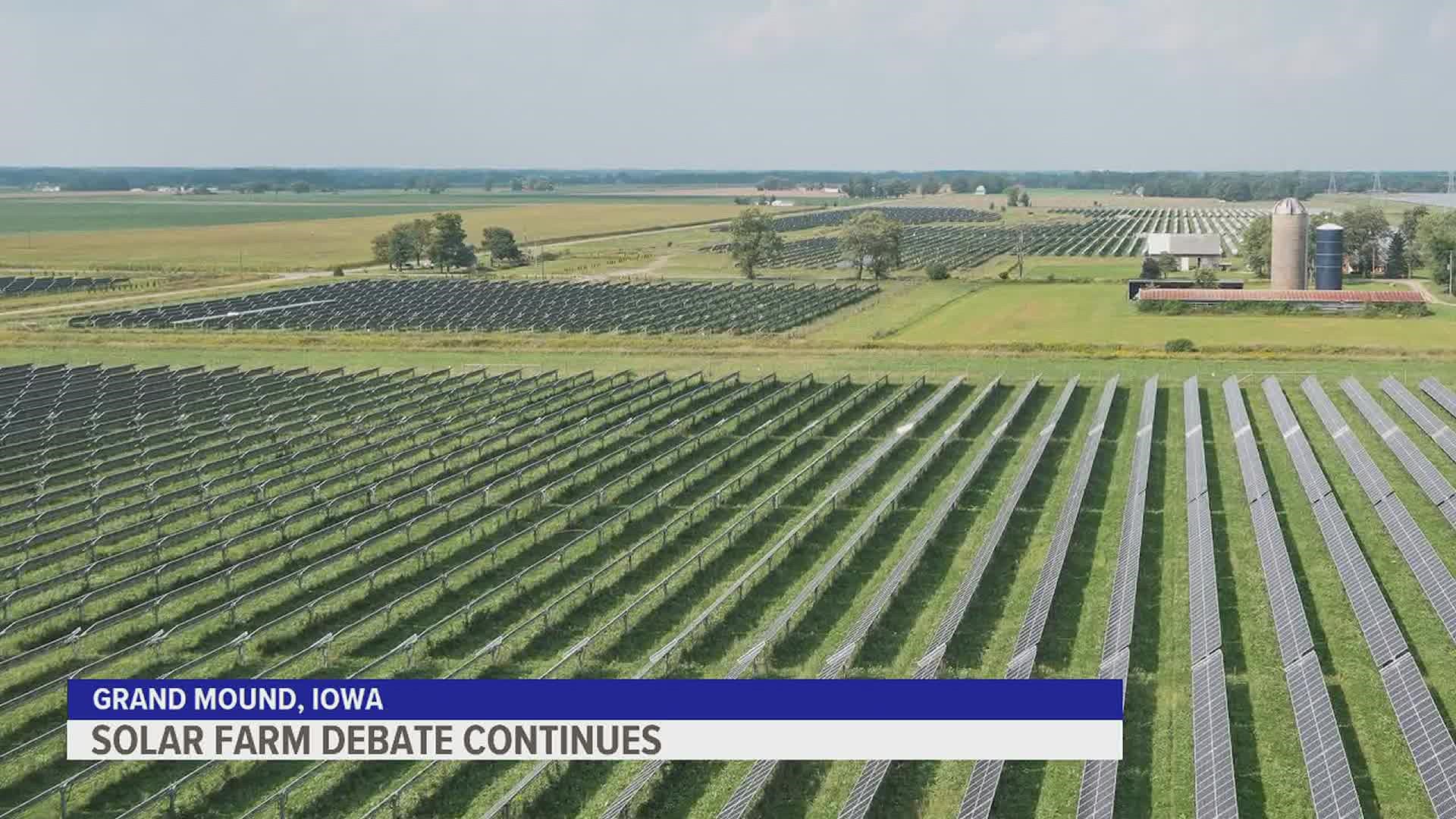CLINTON, Iowa — The Clinton County Board of Supervisors has yet to make a final decision on the proposed 1,500-acre solar farm in Grand Mound, Iowa.
Chicago-based solar energy development company Ranger Power has filed a zoning application to build its $250-million Hawkeye Solar Project, alongside its smaller Hatchling Solar Project.
After months of public debate and discussion, the board met Thursday, April 7 to discuss Ranger Power's application at length. The board went through the county ordinances point-by-point with its lawyers and engineers, asking how Ranger Power has met those points.
"We need to make decisions on, I think, about what we would like to see with this project before we finalize any decisions," board member Daniel Srp said.
One point of discussion, "Does the proposed site support the purpose of the solar project?" was Section 3.6.10 (A). It reads, in part, "Encourage development in line with the master plan for that area: (control urban sprawl, maintain rural character, provide more job opportunities, contribute to small communities)."
Board member Jim Irwin Jr. said he has tried to ask for a certain percentage of the construction jobs to be through local unions and contractors, but "we're not getting anywhere right now with that."
Residents attending the meeting also said they would like assurances from Ranger Power that the jobs will be local.
Irwin added that building the solar farm doesn't maintain the rural character and questioned whether it contributes to small communities.
"I can't say it's gonna contribute to small communities," Irwin said. "Is it gonna contribute to Clinton County and a couple of school districts? Yes. Is it enough tax revenue to offset some of the negativity? I don't know. I'm still trying to weigh that out."
Development Manager Sam O'Keefe previously said the project would generate $12 million in tax revenue over its 40-year lifespan. Half of that would go to the Central Dewitt and Calamus-Wheatland Community school districts. Another 40% would go to Clinton County for roads, infrastructure and public services, and 10% would go to local townships, area colleges, agricultural extension, the assessor and the state.
"Schools are, for many of our communities, are the hub of the community, that everything revolves around the school, about supporting the school," Srp said. "This is additional financial support for the schools as an outcome. And I think that we can have discussions about if there is appropriate additional resources that need to be made available to first responders and other agencies because of having a project like this in there."
One concern Irwin raised was making sure the rural fire departments are properly trained with the necessary equipment if a fire breaks out around the panels.
O'Keefe said he met with the Grand Mound Fire Department two days prior and that Ranger Power is committed to paying for the training.
Chairperson Tom Determann also raised concerns about the project running along Highway 30. He's worried a long-term goal of expanding the highway to four lanes could be put in jeopardy because of the panels or the panels would have to be removed if the highway ever does get expanded.
"I would hate to make a problem right at the end that they can use that against us or something," Determann said. "I would like some more setbacks on Highway 30."
The current project plans to only have the panels for about three-fourths of a mile along the highway. O'Keefe told the board that the Department of Transportation said the panels won't impact their future Highway 30 plans.
The board also wanted to address some of the concerns raised by Grand Mound residents at previous meetings.
One of those concerns was the panels contaminating the soil. The board proposed hiring someone to test the soil before construction begins and again five years later to see if it's changed. They asked if Ranger Power would be agreeable to this. It is unclear whether the county or Ranger Power would be financially responsible.
After four hours of discussion, the board asked Ranger Power to send its responses to the board's requests and questions. The board will meet again at 9 a.m. Tuesday, April 12 to continue its discussion on the solar farm.
Ranger Power currently has six operational solar farms across the Midwest, including in Southern Illinois and Michigan.

